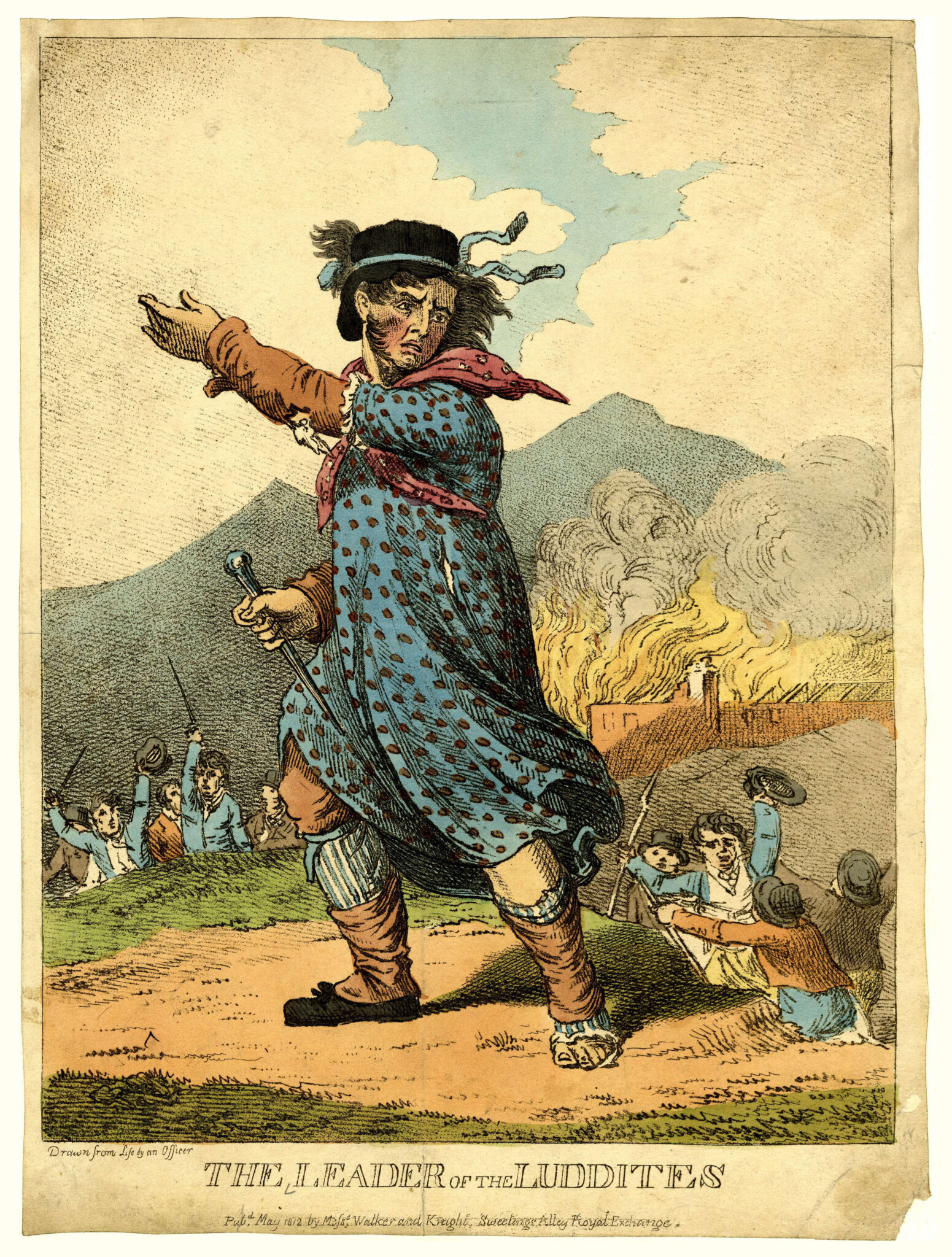Luddite Corn Market Riot
Today in Labor History August 18, 1812: Lady Ludd led the Luddite Corn Market riot of women and boys occurred in Leeds, England. Luddites also rioted in Sheffield against flour and meal sellers. England was suffering huge food shortages and inflation at the time, in part because of the War of 1812, which had started in June, and the ongoing Napoleonic wars. Additionally, new technological innovations were allowing mill owners to replace many of their employees with machines. In response, Luddites would destroy looms and other equipment. To try and get control over these worker outrages, the British authorities made illegal oath-taking punishable by death in July 1812. And they also empowered magistrates to forcibly enter private homes to search for weapons. They also stationed thousands of troops in areas where rioting and looting had occurred over the summer.
“Shirley” (1849), Charlotte Bronte’s second novel, takes place in Yorkshire, 1811-1812, during the Luddite uprisings. She originally published it under the pseudonym, Currer Bell. The novel opens with a ruthless mill owner waiting for the delivery of new, cost-saving equipment that will allow him to fire many of his workers, but Luddites destroy the equipment before it reaches him. As a result of the novel’s popularity, Shirley became a popular female name. Prior to this, it was mostly a male name.
1820s
Today in Labor History August 18, 1823: Slaves in Demerara (Guyana) used their license to travel on an official rest day to launch an uprising of that included more than 30,000 slaves. The rebellion was largely nonviolent, but the authorities still brutally crushed it. They slaughtered hundreds of slaves and executed dozens more after the fighting ended.
The 19th Amendment
Today in Labor History August 18, 1920: The Nineteenth Amendment to the U.S. Constitution was ratified. This guaranteed women’s right to vote. Congress first introduced a women’s suffrage amendment in 1878. Before 1776, women were allowed to vote in several of the colonies, but by 1807 all the state constitutions had denied them this right. In 1848, the Seneca Falls convention adopted the Declaration of Sentiments, calling for equality between the sexes and the right to vote. The Nineteenth Amendment enfranchised 26 million American women just before the 1920 U.S. presidential election. Newly enfranchised women prioritized a reform agenda, including the Sheppard–Towner Maternity and Infancy Protection Act of 1921, which expanded maternity care during the 1920s. This was the first federal social security law and was huge until Congress let it lapse in 1929.
In 1920, only 36% of eligible women voted (compared with 68% of men). This was due to barriers like literacy tests, long residency requirements, and poll taxes. By 1960, women were voting in greater numbers than men. However, 3 million women south of the Mason–Dixon line remained disfranchised. Election officials regularly utilized fraud, intimidation, poll taxes, and state violence to block their access to the polls. In 1926, officials in Birmingham, Alabama beat African American women who were trying to register to vote. These practices continued until the 24th Amendment, in 1962, and the Voting Rights Act of 1965. And they continue today with a host of new voting restrictions being imposed in mostly Republican states.
1940s
Today in Writing History August 18, 1944: Paula Danziger, American children’s book author. She wrote “The Cat Ate My Gymsuit.” She also wrote the Amber Brown series.
Today in Labor History August 18, 1949: 1500 striking lumberjacks fought against police and troops in Finland.
1950s-1970s
Today in Writing History August 18, 1958: Vladimir Nabokov’s controversial novel Lolita was published in the United States.
Today in History August 18, 1977: Steve Biko was arrested at a police roadblock under the Terrorism Act No. 83 in King William’s Town, South Africa. He later died from injuries received during this arrest. Biko was a socialist and an anti-apartheid activist. He was 31 at the time of his assassination. He was influenced by the teachings of Martinican philosopher Frantz Fanon and the American Black Power Movement. His death brought international attention to South Africa’s apartheid policies and helped launch the modern anti-apartheid movement.





